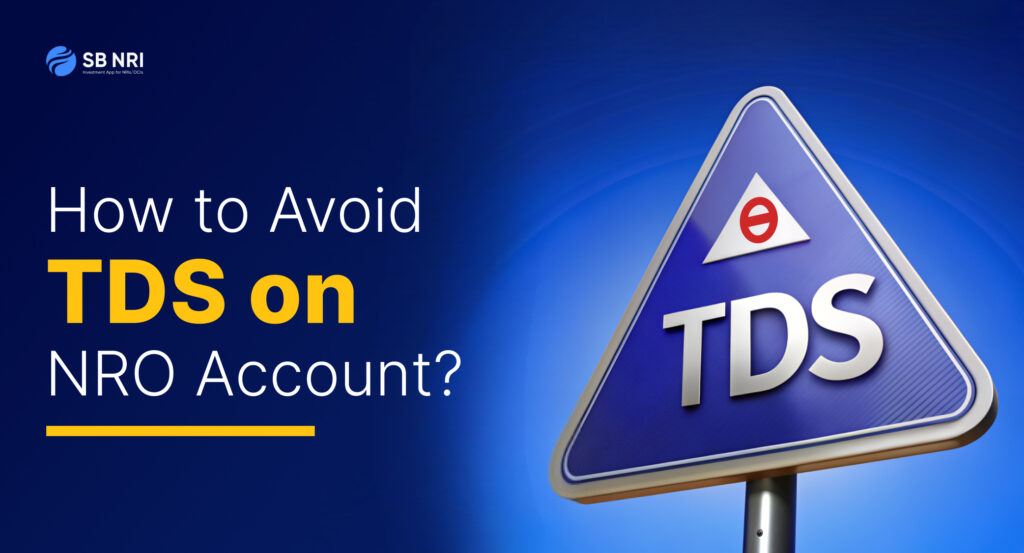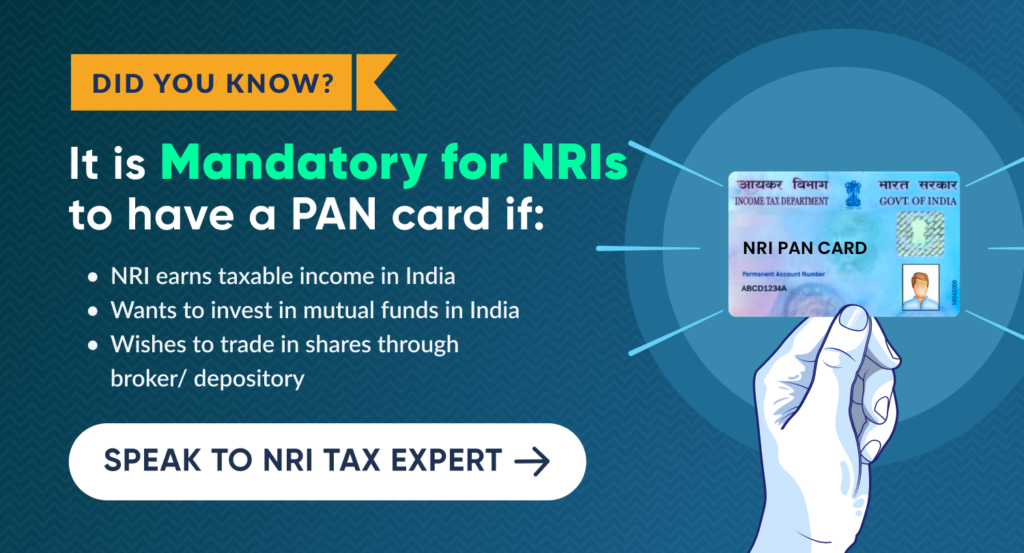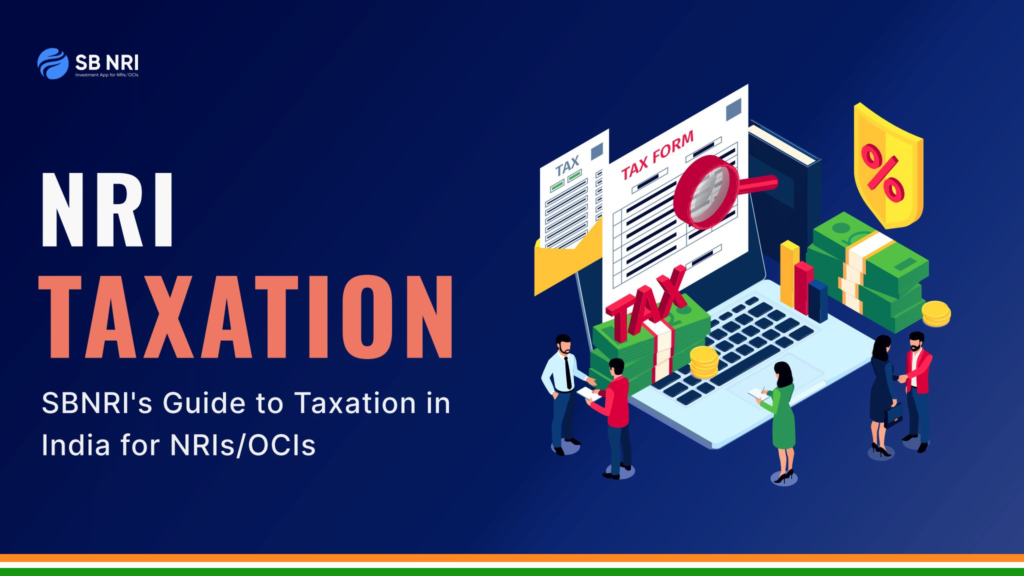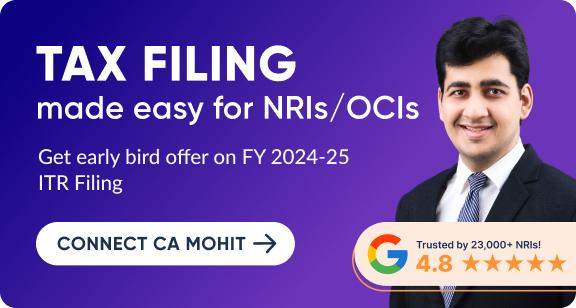
For Non-Resident Indians (NRIs), or Overseas Citizens of India (OCIs), the Non-Resident Ordinary (NRO) account is one of the NRI bank accounts they need to open after a change in their residential status. It allows individuals to manage their income earned in India and facilitates various transactions. However, one aspect that often concerns NRO account holders is the deduction of TDS on their NRO account transactions. NRIs who have invested in India usually have this query, “how to avoid TDS on NRO account’? In this blog post, we will clarify whether NRIs can avoid TDS on NRO account, and if not, then what are the ways by which they can minimize TDS on their NRO account.
How to Avoid TDS on NRO Account?
While it is not possible to completely avoid TDS (Tax Deducted at Source) from the interest earned on NRO (Non-Resident Ordinary) accounts, there are provisions that can help minimize the impact of TDS. Read further to know how you can reduce your tax burden.
How is NRO Account Taxed?
Unlike an NRE account which is completely tax-free in India, NRIs need to pay tax on NRO account income. The bank deducts TDS on the interest income at a 30% tax rate along with education cess and surcharge, if applicable. The remaining amount after TDS deduction is credited to the NRO account.
However, if you are a resident of a country that has a Double Taxation Avoidance Agreement (DTAA) with India, the tax deduction will be based on the provisions outlined in the DTAA between India and your respective country.
To take advantage of this facility, you will need to provide the Tax Residency Certificate (TRC) issued by your resident country, along with a self-declaration as per the bank’s prescribed format.

TDS Rates Applicable for NRO Account
The interest accrued or paid on an NRO account will attract a flat TDS rate of 30%, along with a surcharge and education cess of 4%. It’s important to note that the surcharge rate varies depending on the total interest income, as outlined below:
| Total Interest earned on NRO Account | TDS Rate |
|---|---|
| Total Interest Earned ≤ Rs 50 lakh | 31.2% (TDS @ 30% + surcharge 0% + cess 4%) |
| Rs. 50 lakh < Total Interest Earned < Rs 1 crore | 34.32% (TDS @ 30% + surcharge 10% + cess 4%) |
| Rs. 1 crore < Total Interest Earned < Rs. 2 crore | 35.88% (tax rate @ 30% + surcharge 15% + cess 4%) |
| Rs. 2 crore < Total Interest Earned < Rs. 5 crore | 39% (tax rate @ 30% + surcharge 25% + cess 4%) |
| Total Interest Earned > Rs. 5 crore | 42.74% (tax rate @ 30% + surcharge 37% + cess 4%) |
These rates apply to the TDS deducted on the interest income from an NRO account, based on the respective income brackets and surcharge levels.

Can NRIs Avoid TDS Payment on NRO Account?
No, NRIs cannot avoid the deduction of TDS from the interest earned on an NRO account. However, they can claim a tax deduction on interest income up to Rs 10,000 from their NRO savings account in a financial year, as per Section 80TTA of the Income Tax Act, 1961.
This means that if the total interest income earned from one or multiple NRO savings accounts during a financial year is below Rs 10,000, you can claim an income tax refund for the same.
It’s important to note that this deduction applies only to the interest earned on NRO savings accounts and not on NRO fixed deposits.
Also read: Penalty for Non-filing of ITR by Due Date: Know all the Rules
Double Tax Avoidance Agreement (DTAA)
Furthermore, as mentioned earlier, if you are a resident of a country with which India has a Double Taxation Avoidance Agreement (DTAA), you can take advantage of a lower TDS rate, thereby reducing your tax liability. This can help minimize your tax outgo.
The DTAA rates vary from country to country and for most countries, it lies in the range of 10% to 15%. If one wishes to avail lower tax rate deduction as per the DTAA, he/she can submit the following documents to the Bank:
- PAN card attested by the account holder
- Tax Residency Certificate issued by the tax authorities of the country of residence
- Form 10F, a self declaration form filled by an NRI
- DTAA annexure
How to Claim Deduction Under Section 80TTA
You can claim deduction under Section 80TTA by following these steps:
- Add your total interest income in the ‘Income from Other Sources’ category while filing your tax return.
- Calculate your gross total income for the financial year by combining all sources of income and then deduct the eligible amount under Section 80TTA.
Claiming Tax Benefits
As an NRI, you need to file an income tax return (ITR) in India to be eligible for any tax benefits or refunds. In the scenario where you have exhausted the deduction limit specified in Section 80TTA, you can still claim deductions on your overall Indian income under various tax-saving sections when filing your ITR. Example- If your total income received in India is below Rs 2.5 lakh during a specific financial year, you can proceed with filing your return and obtain a refund for the tax paid on your NRO account.

What is an NRO Account?
An NRO (Non-Resident Ordinary) account is a type of bank account offered by Indian banks to Non-Resident Indians (NRIs) and Persons of Indian Origin (PIOs). It is designed to help individuals manage their income earned in India and facilitate various financial transactions while they reside outside the country.
Features of NRO Account
Here are some key features and benefits of NRO accounts:
- NRO accounts are primarily used for managing income earned in India, such as rental income, dividends, pension, or any other form of income that accrues within India.
- They can be opened as savings accounts, current accounts, or fixed deposit accounts, depending on the banking institution’s offerings.
- NRO accounts are maintained in Indian Rupees (INR), and funds can be deposited, held, and withdrawn in INR.
- NRIs can open NRO accounts jointly with Indian residents on Former or Survivor basis only or with other NRIs.
- NRO account holders are subject to Indian income tax laws. The applicable TDS rate is typically 30% plus applicable surcharge and cess.
- Funds held in an NRO account have restrictions on repatriation. As per rules, one can transfer up to USD 1 million in one financial year post payment of applicable taxes.
Is it Mandatory to Convert to an NRO Account?
Yes, NRIs need to convert their resident account to NRO account once they attain NRI status. As per the Foreign Exchange Management Act (FEMA), in the event of any violation of the act, a penalty of up to three times the amount involved or Rs. 2 lakh (in cases where the sum cannot be quantified) will be imposed. Additionally, the account holder will be responsible for a daily penalty of Rs. 5,000 from the initial day of the violation until the penalty is settled.
Calculate your TDS Refund with SBNRI’s TDS Refund Calculator
A TDS refund is the process of reclaiming the excess tax deducted at source by the payer if the actual tax liability of the taxpayer is lower than the TDS deducted. This situation typically arises when the income tax calculated on the total income is less than the TDS already deducted. To claim a TDS refund, taxpayers need to file an income tax return (ITR). The Income Tax Department processes the ITR and verifies the details. If the tax department finds that the TDS paid is more than the actual tax liability, the excess amount is refunded to the taxpayer.
You can easily find out how much tax refund you can get by calculating your TDS Refund from this TDS Refund Calculator.
Access SBNRI’s Exclusive Guide on DTAA

NRIs and OCIs can now access SBNRI’s exclusive Guide on DTAA covering in-depth information about the applicability of DTAA, rules specific to various countries, how to avail DTAA benefits, and reduce your taxation in India and your home country.
Access NRI Guide on DTAA here
Contact SBNRI
Due to a complicated tax system and recurrent amendments, understanding tax laws can be confusing and NRIs may be subject to additional fees or miss claiming deductions and other benefits. At SBNRI, we understand this struggle. You can download SBNRI App to connect with our NRI Tax Experts to know more about new TDS/ TCS rules for NRIs. You will also get end-to-end assistance related to NRI tax filing. SBNRI will also help you get a lower TDS Certificate.
Looking for NRI ITR Filing? Connect with SBNRI NRI Tax Expert CA Today!

At SBNRI, we have simplified ITR filing for NRIs/OCIs through a smooth digital journey. Be it Basic Filing, Advanced Filing (includes Capital Gain, etc.), or Premium Filing (Foreign Income), we can help you assess the right computation and lower your tax liability.
“We’ve helped over 500+ NRIs/OCIs file ITR returns and more than 25,000+ across other taxation services last financial year and we’d love to help you out too”
You can download SBNRI App or connect with NRI Tax Expert team directly via the button below.
FAQs
Who is eligible to open an NRO account?
NRIs, PIOs, or foreign nationals who have income in India are eligible to open an NRO account.
Can I repatriate funds from my NRO account?
As per the current regulations, repatriation of funds from an NRO account is allowed up to USD 1 million per financial year. However, certain restrictions and documentation requirements need to be fulfilled.
Can I transfer money to NRO account from India?
Transferring money to an NRO account from within India is possible. Since an NRO account functions as a standard bank account, you can transfer funds to it from various Indian bank accounts, including resident savings accounts or other NRO accounts. However, it is essential to be aware of the limitations on repatriating funds from an NRO account to a foreign bank account. The funds held in an NRO account are non-repatriable.
How can I reduce my TDS on NRO account?
NRIs can reduce TDS by claiming exemptions, utilizing tax treaties, submitting Form 15G or Form 15H, and deducting expenses related to their income.
Is money deposited in a NRO account taxable?
An NRO account is subject to a 30% tax on total income accrued in India, as stipulated by the Income Tax Act of 1961. Additionally, a cess is applicable on the total tax liability. The interest earned on NRO accounts is also taxable.



